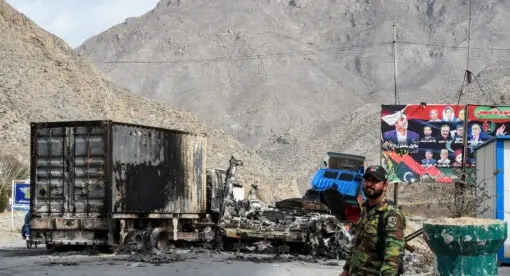Reducing Iranian influence in Syria (and by extension the broader region) is meant to be a central feature of U.S. foreign policy, but Washington’s efforts over the past decade have so badly failed to achieve this objective that it could be argued that Syria’s dependence upon Iran has in fact increased. If indeed Washington remains committed to reducing if not erasing Iran’s presence in the country, it must be prepared to make hard decisions to end the war by restoring Syrian sovereignty throughout the embattled country.
On the face of it, reducing Iranian influence in Syria should not be such a challenge. There is surprising agreement among Syria’s friends and enemies alike that Iran’s outsized role in the country needs to be diminished, if not erased. The rationales supporting this consensus may differ, but the objective is the same.
Russia sees Iran as a strategic competitor in the country. Notwithstanding their successful joint efforts to crush the rebellion against Damascus, Moscow wants a freer hand to rebuild and direct Syria’s security arms and to win for itself whatever strategic advantage and economic rewards result from the Syrian state’s triumph over its adversaries. Tehran’s interests are often in conflict with this agenda.
Iran’s vast influence in Syria also complicates Russia’s efforts with Israel, Turkey and the United States to mediate an end to the conflict – the key to which is the emergence of a national government able to impose its writ over the entire country. Indeed, even without reference to Washington’s opposition to Iran’s influence, the creation of pro-Iranian power centers in the country – whether in economic or military and security contexts – confounds Russian objectives.
Syria’s Arab hinterland fears and opposes the close ties between Damascus and Tehran. This is a longstanding concern, dating from the successful efforts of Syrian President Bashar al-Assad’s father, Hafez al-Assad, to build close relations with revolutionary Iran in order to confront the destabilizing policies of Saddam Hussein. Iran’s influence has only grown since the revolt against the Assad government began in 2011. In order to survive the Assad regime has become increasingly dependent upon the Iranians.
Region Increasingly Wary of Tehran
In recent years, Arab support for toppling the Assad regime and expelling Iranian influence, once an engine of the conflict, has all but disappeared. In its stead is a more nuanced, incremental effort to reconcile with the regime in the hope of reducing Iran’s influence.
While it may not have much of a choice, Iraq has little interest in playing the role of gateway for growing Iranian influence toward the Mediterranean or in suffering the consequences of Iran’s clashing interests with the United States. Jordan, already managing the presence of two stronger powers – Saudi Arabia and Israel – on its borders, has no interest in enabling closer Syrian ties with yet another power with regional aspirations.
Turkey, as the self-appointed protector of Sunni interests, views Iran as a sectarian interloper, in a manner not all that different from the timeless competition between Tehran and Istanbul for Arab allegiance throughout the region. The ongoing war has sparked unprecedented Turkish efforts, not only in northwest Syria but also in Iraq and, most recently, Libya. The central objective of Ankara’s policies is to confront Iranian influence along its frontier with the Arab world.
Israel sees a strategic threat in Iran’s presence along its Golan border. Until the outbreak of war in 2011, the relationship between Damascus and Tehran always looked toward Baghdad and the threat posed initially by Saddam Hussein and after his ouster by the collapse of the country in the wake of the U.S. invasion. Since 2011 however, the weakness of the Assad regime has created the opportunity for Iran to move west, bringing its conflict with Israel – already present with Hezbollah’s deployment along Lebanon’s border – to Israel’s northern frontier in the Golan Heights.
Syria’s own nationalist history suggests a popular and ideological imperative to restore Syria to the Syrians and thus limit the long reach of Iran – and anyone else – in their country. The idea of Syrian nationalism has indeed suffered a body blow, but it remains a formidable force in Syria’s future. Iranians are not strangers in Syria. Trade and religious relations go back centuries. Notwithstanding this often intimate history and four decades of relations, the Syrians do not appreciate their country being dominated by Iran.
The U.S. “Maximum Pressure” Strategy Against Iran
Washington has set Iran’s expulsion from the country as the lodestar of its overall policy of “maximum pressure” to roll back Iranian influence – and not only in Syria. The Trump administration opposes anything Iran supports anywhere in the world, from Venezuela to China. The latter’s recently announced economic and security partnership with Tehran places Iran at the center of the cold war that now characterizes U.S. relations with China.
Washington has long promoted the view that policies aimed at Syria’s isolation will force Damascus to cut ties with Iran. A key part of this wide-ranging offensive is to cajole and/or force Syria’s economic partners in the Fertile Crescent, and from Beijing to Berlin, to accept the costs of Washington’s demand to delink their economic ties with the regime. In this effort, Washington has devised a steady and expanding menu of sticks, but very few carrots. And, however improbably, it views Tehran’s stubbornly resilient and indeed expanding military, economic and security ties with Damascus as evidence of their imminent collapse.
Only Iran, its Iraqi proxies, and Lebanon’s Hezbollah unreservedly challenge this axis. Yet their policies have proven more successful than the combined efforts of the wide array of stronger opponents to limit or defeat it. No one doubts that policies championed by Washington have narrowed the scope of Syria’s ability to escape the severe consequences of “maximum pressure.” But while U.S. policies have helped to make life in Syria miserable and made it impossible for the regime to celebrate the defeat of its many opponents, Washington has not come close to forcing a collapse of Iran’s position in the country – a foreign policy failure of the first order.
Indeed, the campaign against the Assad regime has enhanced rather than weakened the ties that bind Damascus and Tehran – most recently evidenced by an agreement reached in July to expand “comprehensive” military and security cooperation. The protocol, signed by Chief of Staff of the Iranian Armed Forces Mohammad Baqeri and Syrian Defense Minister Ali Abdullah Ayyoub in Damascus, “will increase our determination for joint cooperation to confront the U.S. pressures,” including strengthening Syria’s air defense system, Baqeri said. Ayyoub observed that the United States has been “unable to bring Iran, Syria and the resistance front to their knees.”
It is long past time for the United States to reassess the utility of instruments employed to achieve its objectives in Syria. Washington remains the outlier in this process of recalibrating its Syria policies, if not their objectives. Indeed, it could well be argued that more of the same only enhances Tehran’s value to Damascus and Moscow and postpones the long-sought after day when Iran’s presence in Syria is made to surrender its outsized role.
To be sure, there are no good choices in Syria. The upcoming U.S. presidential election could be an opportunity for a reset, but recalibrating the current failed policy declarations, however necessary, will necessitate hard and unpopular decisions that no administration will want to make, no matter who is in the White House in January.
A Syria deal that accommodates Russia, Israel, the United Arab Emirates, Turkey, and the Assad regime will not be easy, nor will it pay quick dividends. But it will squeeze the Syrian space in which Iran operates. The view, widespread among Democrats, that Trump “stabbed the Syrian Democratic Forces in the back” when the United States abandoned positions east of the Euphrates last year will make it more difficult for a Democrat in the White House to pay the high price required to stabilize the Syria/Turkey border and end the insurgency in Idlib. Not a pretty picture to be sure, but Washington is in a deep hole in Syria. Climbing out will not be fun or easy.
Geoffrey Aronson has been writing about Israel-Palestinian affairs since 1976. He is the author of “Creating Facts: Israel, Palestinians and the Intifada” and the former editor of the Report on Israeli Settlement in the Occupied Territories. He has worked with the EU, World Bank and numerous European governments on issues related to Israeli and Palestinian security and hosted a historic Track Two engagement between Israel and Syria in 2005.
The views expressed in this article are those of the author and not an official policy or position of the Newlines Institute.







